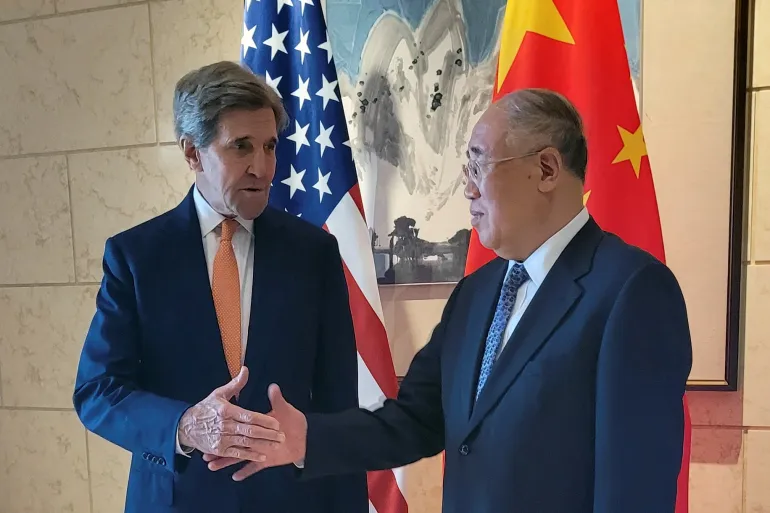The two biggest greenhouse gas emitters hold talks in Beijing as extreme weather grips much of the globe.
United States climate envoy John Kerry has called for “urgent action” to tackle the climate crisis after four hours of talks with his Chinese counterpart in Beijing as the two countries revived stalled diplomacy on reducing planet-warming emissions.
“In the next three days we hope we can begin taking some big steps that will send a signal to the world about the serious purpose of China and the United States to address a common risk, threat, challenge to all of humanity created by humans themselves,” Kerry said after the talks on Monday, noting the proliferation of storms and fires as extreme weather grips much of the globe.
The world’s two biggest greenhouse gas emitters restarted the climate talks after political tensions stalled them last year.
“The climate crisis demands that the world’s two largest economies work together to limit the Earth’s warming,” Kerry tweeted after meeting his Chinese counterpart, Xie Zhenhua, on Sunday night for a one-on-one dinner.
Beijing said after the talks that “climate change is a common challenge faced by all mankind”.
China would “exchange views with the United States on issues related to climate change and work together to meet challenges and improve the wellbeing of current and future generations”, foreign ministry spokesperson Mao Ning said.
As the leading emitter of the greenhouse gases driving climate change, China has pledged to ensure its carbon emissions peak by 2030 and achieve carbon neutrality by 2060.
President Xi Jinping has also said China will reduce its use of coal from 2026.
But Beijing approved a major surge in coal power in April – a move Greenpeace said prioritised energy supply over the emissions reduction pledge – fuelling concerns that China will fail to meet its targets.
Li Shuo, global policy adviser for Greenpeace in East Asia, said that while China has been the largest manufacturer and deployer of wind and solar energy, both Beijing and Washington are “strongly addicted to the burning of fossil fuels”.
“The climate crisis is inescapable at this point,” Shuo told Al Jazeera. “If you look at the summer that we’re having across the world, this really drives the message of climate urgency.”
Global temperatures headed towards alarming highs and extreme weather proliferated this month with scientists saying the target of keeping global warming within 1.5C of pre-industrial levels is moving beyond reach.
Prolonged high temperatures in China are threatening power grids and crops and raising concerns about a repeat of last year’s drought, the most severe in 60 years.
In the US, a quarter of the population fell under extreme heat advisories, partly due to a heat dome that has settled over western states.
Working together for the climate
Kerry’s trip follows two other high-profile visits by US officials – Secretary of State Antony Blinken and Treasury Secretary Janet Yellen – that were aimed at stabilising US-China ties.
Talks were suspended in August when the then-speaker of the US House of Representatives, Nancy Pelosi, enraged Beijing by visiting self-ruled Taiwan, which China considers part of its territory.
Al Jazeera’s Katrina Yu, reporting from Beijing, said Kerry’s visit “comes amidst heightened tensions between the US and on a range of issues including trade, Taiwan and the war in Ukraine. Analysts say both must set aside differences and work together on climate change and set a positive example ahead of the COP28 conference in Dubai later this year.”
While China said cooperation with the US on climate change was “generally good”, sticking points remained. “China accuses the US of unfairly criticising its climate record while failing to meet its own pledges, including financing developing countries,” Yu said.
China has bristled at US calls that it should do more to cut greenhouse gas emissions, saying it is a developing country with historical emissions that remain significantly lower than those of the US.

